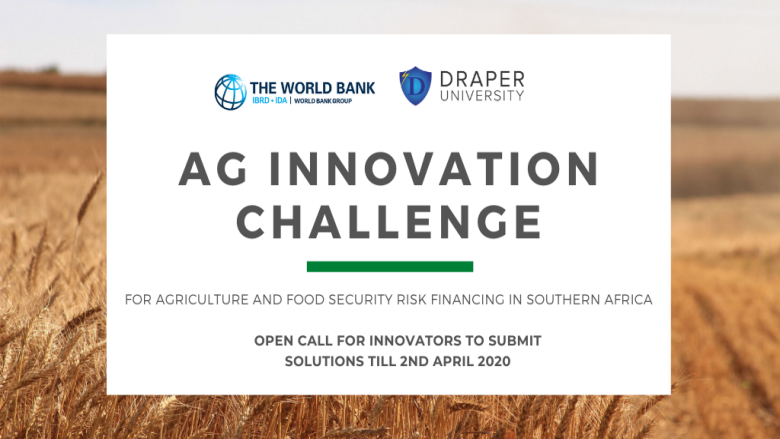The World Bank’s Agriculture Observatory, in conjunction with the Disaster Risk Financing and the Disaster Risk Management teams, and with the support of Draper University launched three Agriculture Risk innovation challenges to harness new technology and data to address the agriculture and food security risks in Southern Africa.
If you missed the livestream, you can watch the replay here: Southern Africa Agriculture Innovation Challenge
Learn about the Ag Innovation Challenge 'Top Innovators'
Judging has been completed and the winner for each challenge is:
Alternative Methods for Measuring Weather Variables Challenge
Winner: Arable (USA)
Real-time microclimate and crop health data on two time horizons: driving daily farm operations and providing insight into seasonal yields.
Predicting or Monitoring Animal and/or Plant Pests Challenge
Winner: Fall Armyworm Alert Service-Satelligence (Ghana)
The system combats the invasion of fall armyworm in sub-Saharan Africa by providing early warning messages based on satellite technology.
Bring Your Own Agriculture Data Challenge
Winner: CropIn (India)
Building large and smart datasets through innovative ICT-driven data collection techniques, that enables farmers access to risk and financing instruments
The World Bank Grand Jury recognizes the high quality of all finalists with additional Honorable Mentions awards:
Honorable Mention for Harnessing Social Media: Injini: Contribute Data Using Social Media (South Africa)
Honorable Mention for Accessibility: Saillog (Israel)
Honorable Mention for Innovative Locally Sustainable Business Model: eSusFarm (South Africa)
The challenge drew participants from 33 countries who submitted 120 proposals. The 20 finalists excelled in all categories across the board:
• Community based Extreme Weather Events Portal (South Africa)
• Contribute Data Using Social Media (South Africa)
• Arable (US)
• Carpe Diem Solutions (Israel)
• Openagri.ai (Indonesia)
• AIGROEDGE Technologies Private Limited (India)
• Saillog (Israel)
• Yuktix Technologies Private Limited (India)
• GeoPotato (Bangladesh)
• RVF-Zero (Senegal)
• Innosapien Agro Technologies (India)
• Intelligent monitoring, analysis, and early warning system for fall armyworms (Taiwan)
• Fall ArmyWorm Alert Service / Satelligence (Ghana)
• Jaguza Livestock (Uganda)
• eSusFarm (South Africa)
• Satyukt Analytics Private Limited (India)
• The Namib Bee Project (Namibia)
• Aerobotics: Citrus Yield Estimation (South Africa)
• CropIn Technology Solutions Pvt Ltd (India)
• BeCrop, the new layer of functional soil data (US)
The Grand Jury included the following experts:
· Cristina Stefan, World Bank
· Martin Reto Buehler, International Finance Corporation
· Eric Seyama, Government of the Kingdom of eSwatini
· Erick Fernandes, World Bank
· Asra Nadim, Draper University
· Nathan Engle, World Bank
· Claire Rhodes, Producers Direct
· Ricardo Negri, World Bank
· Jolene Dawson, Accenture
· Ghislain Aihounton, World Bank
· Naomi Sakane, World Bank
· Luis de la Plaza, World Bank
· Pedro Dozi, Government of Angola
· Parmesh Shah, World Bank
· Natalia Olson, RadicalXchange
· Herve Trebossen, World Bank
· Nelli Orlova, InnMind
The Agriculture Risk innovation challenge is supported by the Global Facility for Disaster Reduction and Recovery (GFDRR) and The State and Peacebuilding Fund (SPF). Partners in this effort include: Gro Intelligence, Accenture, African Development Bank, InnMind, Georgetown University, the Platform for Agriculture Risk Management (PARM)
